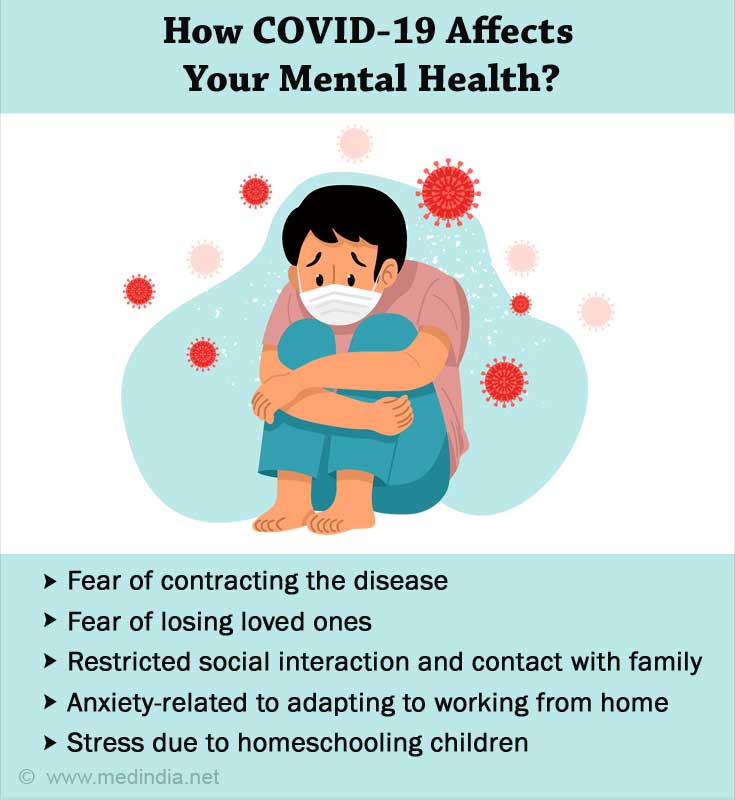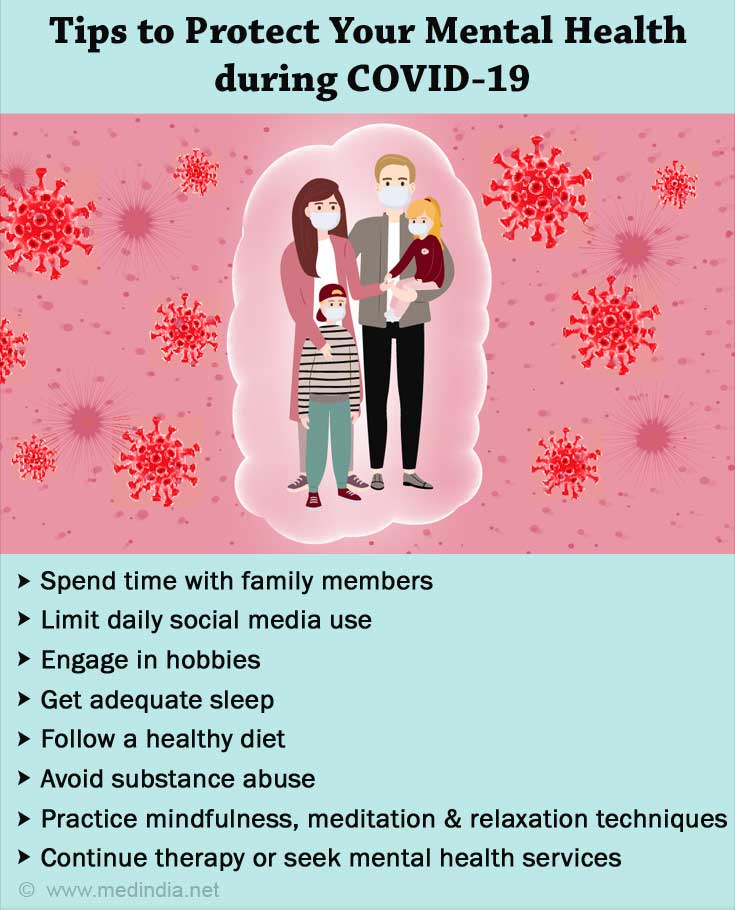- SARS-CoV-2 Data - (https://www.ncbi.nlm.nih.gov/sars-cov-2/)
- Coronavirus - (https://www.who.int/health-topics/coronavirus#tab=tab_3)
- The coronavirus (COVID-19) pandemic's impact on mental health - (https://www.ncbi.nlm.nih.gov/pmc/articles/PMC7361582/)
- COVID-19 pandemic and mental health consequences: Systematic review of the current evidence - (https://www.ncbi.nlm.nih.gov/pmc/articles/PMC7260522/?utm_source=yahoo&utm_medium=referral&utm_campaign=in-text-link)
- Mental health & COVID-19 - (https://www.who.int/teams/mental-health-and-substance-use/covid-19)
- COVID-19 disrupting mental health services in most countries, WHO survey - (https://www.who.int/news/item/05-10-2020-covid-19-disrupting-mental-health-services-in-most-countries-who-survey)
- The Implications of COVID-19 for Mental Health and Substance Use - (https://www.kff.org/coronavirus-covid-19/issue-brief/the-implications-of-covid-19-for-mental-health-and-substance-use/)
- Bidirectional associations between COVID-19 and psychiatric disorder: retrospective cohort studies of 62 354 COVID-19 cases in the USA - (https://www.thelancet.com/journals/lanpsy/article/PIIS2215-03662030462-4/fulltext)
- COVID-19 (coronavirus): Long-term effects - (https://www.mayoclinic.org/diseases-conditions/coronavirus/in-depth/coronavirus-long-term-effects/art-20490351)
- Post-COVID Conditions - (https://www.cdc.gov/coronavirus/2019-ncov/long-term-effects.html)
- Protecting your mental health during the coronavirus pandemic - (https://publichealth.jhu.edu/2020/protecting-your-mental-health-during-the-coronavirus-pandemic)
What is COVID-19?
COVID-19, a pandemic caused by SARS-CoV-2 has taken the world by storm over the last year. Being a respiratory illness that passes from person-to-person when in close proximity, coronavirus has proven to be a tough contender to bring under control. It can also spread via surfaces but the risk of this is very low. The number of global cases until now is 22.06 crores. The pandemic has cost 45.65 lakh people their lives.
Governments across the world have been collaborating to control the spread of the disease. People have been advised to stay at home as much as possible. Social distancing, wearing masks, and washing hands frequently have been recommended.
With constant mutations, the virus continues to hinder normal life as it was known. As the infection rate drops and rises, many countries still face restrictions that were not present prior to COVID-19. These restrictions, the stress associated with falling sick, losing loved ones and other factors have contributed greatly to emotional distress and anxiety during COVID.
How the COVID-19 Pandemic Can Affect Your Mental Health?
COVID-19 has been completely unprecedented and affected the lives of millions in various ways. Mental health during lockdown has been a topic of discussion among health professionals. The pandemic has contributed to stress in various ways putting individuals at risk for mental health issues. Let us understand how the disease has contributed to triggers in various ways:

- Fear of contracting the disease
- Fear of losing loved ones
- Restricted social interaction and contact with family and friends leading to feelings of sadness and loneliness
- Anxiety-related to adapting to working from home
- Fear of or actual loss of job and livelihood
- Stress caused due to homeschooling children
- Worsening of symptoms for those already facing mental health issues
Among children, mental and psychological effects of the pandemic include increased anxiety, depression, sadness, difficulty paying attention, headache, body pain, changes in sleeping and eating habits, and loss of interest in activities.
In older adults, emotional outbursts, disruption in eating and sleeping schedules and irritability may be seen. People may also feel a sense of hopelessness and helplessness about the situation, which is a symptom of depression. Increased levels of substance use and physical abuse at home are also possible outcomes.
Health workers who have been overburdened with work for several months now, losing close colleagues, patients, working without proper protection are also at high risk of anxiety, depression, and burnout.
Health professionals may also face stigma with people avoiding them or behaving differently. This could cause sadness, anger, and frustration. This is also possible in recovered patients who are out of quarantine.
What do the Statistics Show with Respect to Mental Health during COVID?
- In 93% of the countries, mental health services have been affected due to the pandemic.
- Studies show that 4 in 10 reported experiencing anxiety or depressionduring the lockdown, which is a 30% increase.
- Young adults were more likely to report depressive or anxiety disorders with a high rate of 56%. Substance abuse was also at an increased level of 25% and suicidal thoughts were found to have increased from 11% to 26%
- Adults without a job or facing financial difficulties, were more likely to face mental health issues (53%) than those without such issues (32%).
- Essential workers were at a higher risk of anxiety and depression (42%), suicidal thoughts (22%), and substance abuse (25%).
- Mothers were found to be at an increased risk of depression and anxiety compared to fathers.
COVID-19 Mental Health in India
Mental health during COVID-19 in India has taken a severe hit.
- 63% of elderly individuals were found to have symptoms of depression due to loneliness.
- 65% of individuals between 18 and 24 years show symptoms of depression.
- The number of individuals being admitted in government setups and seeking help online has also increased.
Does Contracting COVID Contribute to Mental Health-related Issues?
Contracting COVID-19 has been linked to mental health issues. After 3 months following the diagnosis of COVID-19, 20% of individuals were found to have mental health issues such as anxiety, depression, and dementia. This is double the risk. Insomnia and post-traumatic stress disorder are also common in people who have recovered from COVID recovered patients.
Interestingly, having a psychiatric illness a year before was associated with a 65% possibility of contracting COVID. Reduced immunity could also play a role in this. The chances of fatal outcomes, uncertainty and social isolation make contracting COVID a very stressful affair.
Coronavirus has also been found to cause neurological complications such as dizziness, delirium, confusion, and cognitive difficulties. There is an increased chance of relapse for patients previously treated for mental health issues. Chronic fatigue syndrome and
Tips to Protect Your Mental Health during COVID-19 Pandemic
Protecting mental health during COVID is crucial considering the range and extent of dysfunction and distress it can cause. Tips to protect mental health during COVID include:

- Having a structure or schedule which helps tackle uncertainty
- Limiting news intake to what is necessary for practical purposes
- Spending time with family members
- Maintaining social connections virtually or in person if possible
- Limiting daily social media use
- Engaging in hobbies
- Ensuring to get adequate sleep
- Following a healthy diet with nutritious food
- Keeping some time for exercise
- Volunteering time, money or efforts to help those in need
- Using virtual support groups
- Turning to faith and spirituality for hope
- Practicing mindfulness, meditation, and relaxation techniques
- Avoiding substance abuse
- Continuing therapy or seeking mental health services if needed







